My article for Remake, published on May 15, 2024, “Made in Italy: How Prato Became One of Fashion’s Biggest Manufacturers,” recounts the history and tells today’s story of immigrant workers in Italy’s fashion industry, with an emphasis on Prato and the Florence Area. The article includes my interviews with workers themselves.
Work
Collaborating Out Loud: Stories by Immigrant Garment Workers From Italy and To Italy
“Collaborare ad Alta Voce: Stories by Immigrant Garment Workers From Italy then and to Italy Now,” was an evening of multi-media story-telling and discussion about Italian and Jewish immigrants working in NYC’s garment industry at the turn of the XX century and today’s immigrant workers in Tuscany’s fashion sector.
With Francesca Ciuffi, Maria Grazie Cotugno, Giulia Falzoi, Debora Florio, Alison Morse, Raza Muhammed, Claudio Tosi and Abbas Zaigham
Organized by Alison Morse
March 16 at 6:30 pm at Bio Fashion Lab, Via Alfonso La Marmora 25A 50121, Firenze

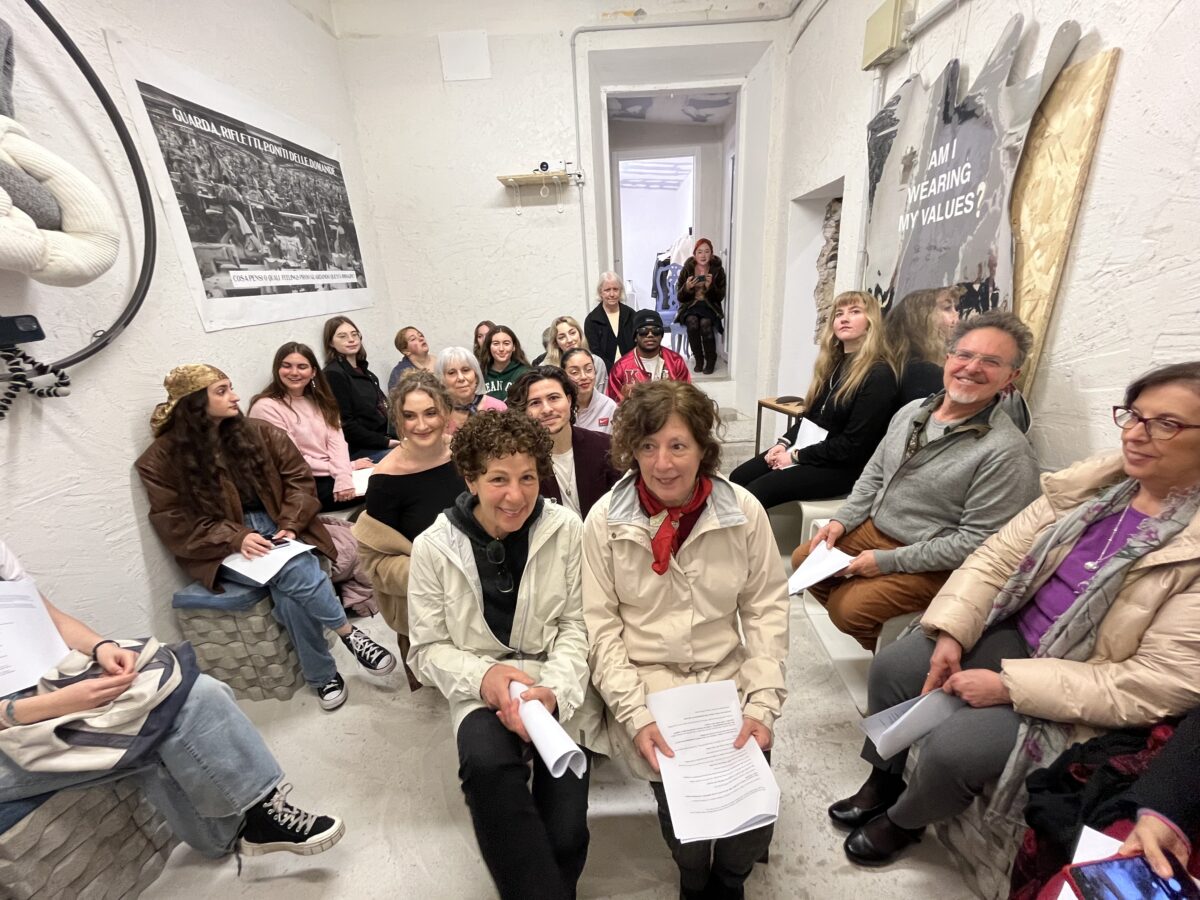
Audience at Bio Fashion Lab
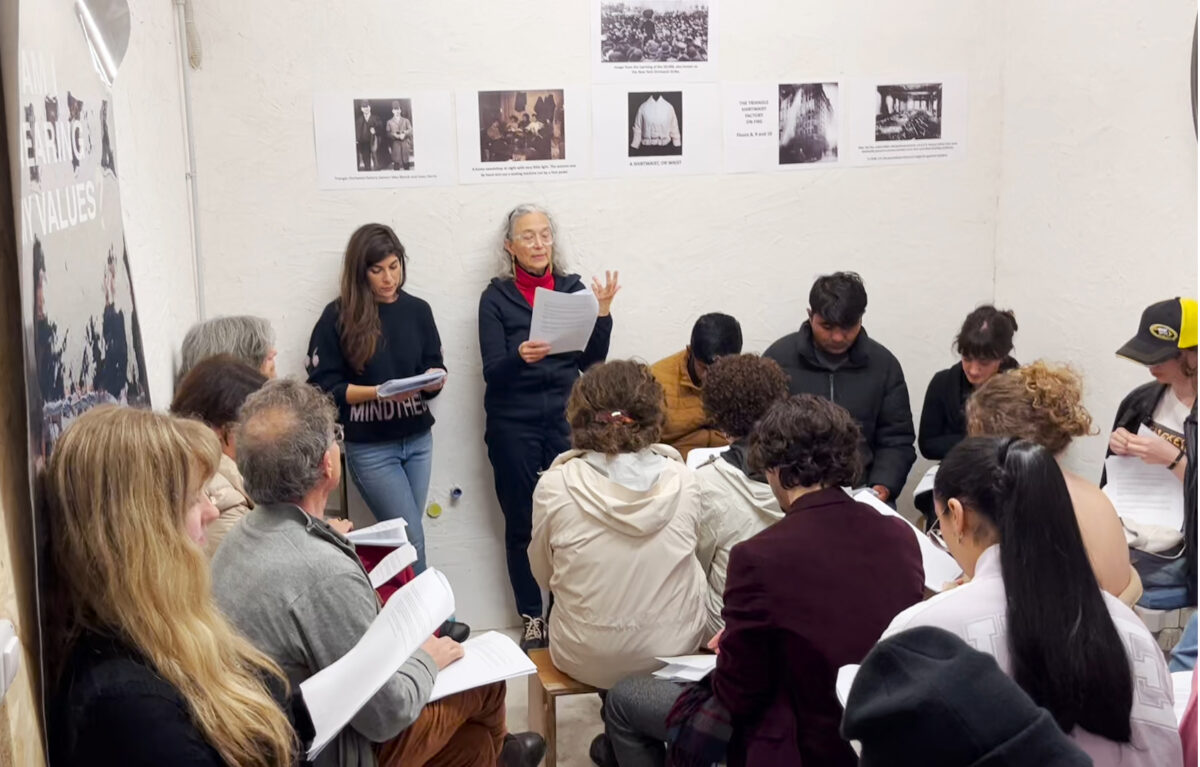
Alison reading her poetry
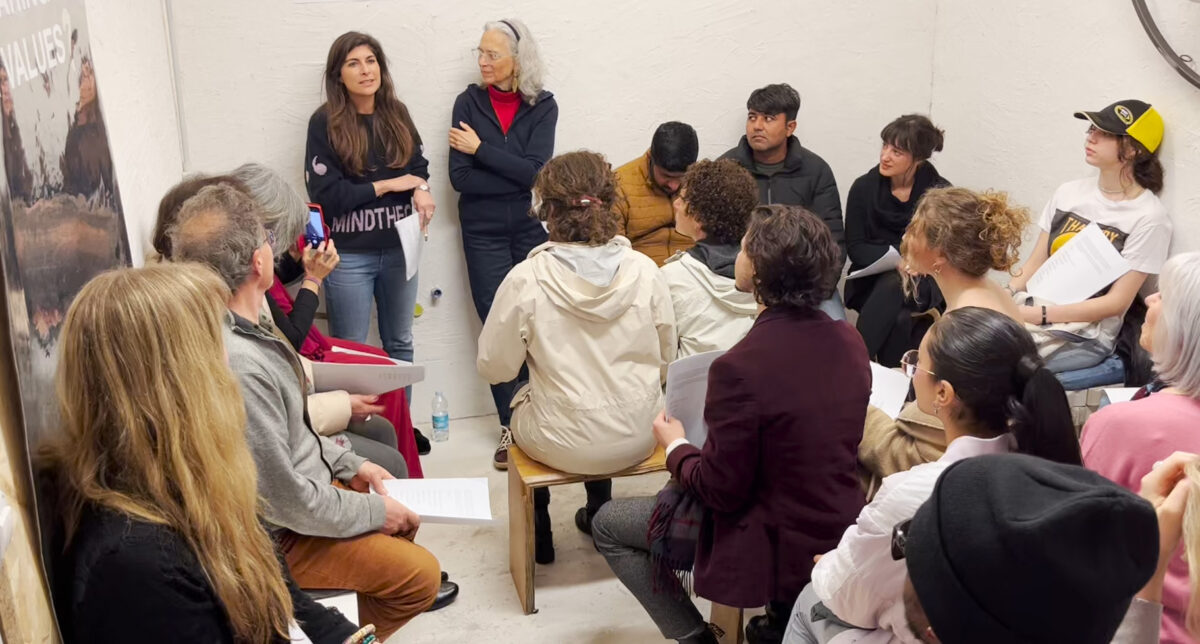
Debora talking to the audience
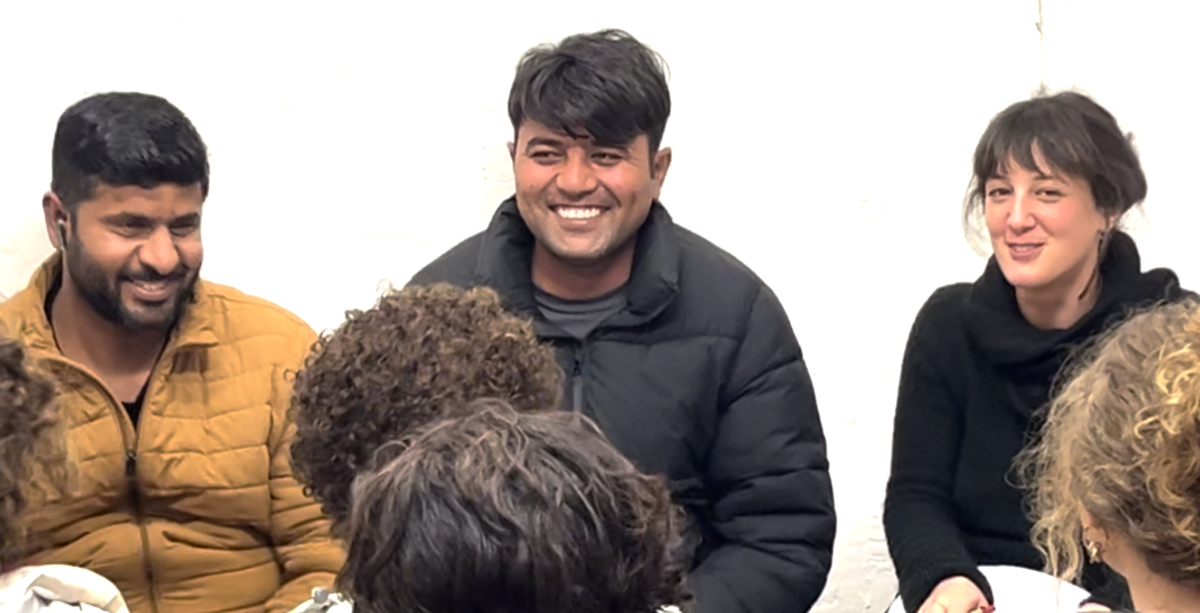
Abbas, Raza and Francesca respond to an audience question after Abbas and Gaza told stories in Italian of their struggles for fair pay and decent work hours in the Tuscan leather factory where they work — a factory making products for an international luxury brand — and the support they receive from the 8X5 Movement in Prato. Francesca, from the 8X5 Movement, translated their stories into English.
My Poem at the Rutgers’ LEARN Event “From Triangle To Rana Plaza To Temp Workers: Building Worker Power”
On May 6th, I presented one of my poems, “Ready to Wear,” which was also translated into Bangla, as part of the Rutgers University Labor Education Action Research Network (LEARN) Event “From Triangle To Rana Plaza To Temp Workers: Building Worker Power,” an international virtual panel discussion with:
Moderator: Dina Siddiqi, Clinical Associate Professor, Global Liberal Studies, NYU
Alison Morse, Poet
Taslima Akhter, Photographer and President BGWS
Rupali Akhter, former Garment Worker at Rana Plaza, Secy for Health Support, BGWS
Reynalda Cruz, Worker Organizer New Labor Taslima Akhter, Photographer and President BGWS
Carmen Martino, Rutgers LSER, Dir, Occupational Training and Education Consortium
Abul Ahsan Rubel, Executive Coordinator of Ganosamhati Andolon (People’s Solidarity Movement) and Chief Coordinator of Protibesh Andolon (Ecological Movement)
Four of My Poems in The Bangalore Review
Four of my poems, “Union Maids,” “To Target,” “#Garment Workers, Too,” and “Craft Project,” appear in The Bangalore Review.
Two Poems in Social Fabric
Two of my poems, “Conundrum Dream Dialogue” and “Delicate Cycles,” appear in Social Fabric, an anthology of visual art and personal writing about textiles and apparel.
Two Poems in Portland Review
Two poems, “Interview with Aduri and Translator, Shubomoy Haque, in Savar, Bangladesh,” and “Sisters,” were published by Portland Review for their Labor Issue.
Two Poems in Puerto del Sol
Two poems from my ms-in-progress, “Kafan” and “First Interview”, were accepted by the journal Puerto del Sol for publication in 2019.
On the Last Night in Dhaka
published in Jaggery
part of The Price of Our Clothes
After a morning highway ride
to Savar, passing roadside piles
of white bags stuffed
with broadcloth pockets,
gingham shirt fronts,
denim lapels—tons
of cotton remains
from factories—
after riding past smokestacks
rising through dirt,
spewing soot
from buried kilns
baking handmade bricks,
after watching, in Savar,
Rana Plaza survivors
push pant legs through
sewing machines
loud as machine guns,
after reaching, by afternoon,
Dhaka’s public cemetery,
to see how microbes
have decomposed
the unidentified
Rana Plaza dead,
after sunset dims my view
of Dhaka’s women garment workers
to silhouettes climbing
on fire escapes, like worker ants,
from one factory floor
to another,
after sitting in starless night
on a mattress in a muddy yard
opposite Pamina, who says:
I have no way out
of the garment industry,
I am confined
with the betterment of my children,
I lie in my hotel bed,
awake to American techno-pop,
jack-hammered from
a nearby disco.
Red, white, blue, flash
into the night with every beat.
Soldiers at the hotel entrance
guard guests—potential targets
for handmade bombs.
After two weeks in Bangladesh,
I long for this country’s
five a.m. call to prayer,
my own country’s music
to stop.
If You Wave a Chicken Over Your Head Chapbook
If You Wave a Chicken Over Your Head
is Alison’s collection of very short stories
published by Red Bird Chapbooks.
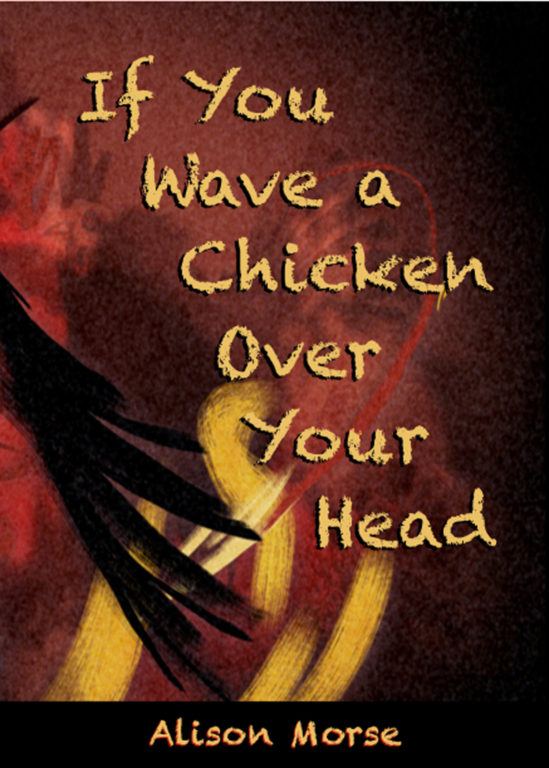
Each story of one thousand words or less in Alison Morse’s If You Wave a Chicken Over Your Head offers a tiny universe. Here, original voices bring their distinct circumstances and compelling troubles to life with honesty and humor. We embark on a wild and glorious ride, immersed in perfectly rendered specificity: food and drink; art supplies; ancient and contemporary history; multiple Jewish cultures; popular music; and climate change. Across time and geography, these characters each seem to wonder: how can one live out goodness in this eternally flawed world? Thankfully, Morse offers no easy morality or pat answers. Instead, her rich images and intimate details add up, and the work is elevated: each line a captivating poem, every story an illumination.
—Beth Mayer, Editor of If You Wave a Chicken Over Your Head
Continuing Education
a story in Alison’s chapbook If You Wave a Chicken Over Your Head
originally published as “Adult Education” in The Pedestal
The night before my mother died, she opened her eyes, sat up, and vomited her hospice dinner. I wiped her chin with trembling hands.
She whispered: “Honey, you’re already forty one. I should have taught you how to kill a chicken. Maybe then you wouldn’t be so afraid.”
I tried to think of something to say that wouldn’t start an argument. She fell back asleep.
“I don’t want to lose you,” I said.
She did not wake up, and stopped breathing at five a.m. Three hours later the mortuary attendants zipped her body, emaciated from breast cancer, into a rubber bag. I forced myself to watch—determined to prove to her how courageous I could be.
For the funeral, my husband Josh made a poster out of my favorite photo of her, taken when she was thirteen on her parents’ farm in North Dakota. In it, she’s smiling, wearing jeans. A cowboy hat tilts over one eye. Hens peck the ground by her feet, oblivious to the Jewish farm girl who took pride in cutting their throats with one clean thwack.
The rabbi from the funeral home, who’d never met my mother, conducted the service. I had fed him her story: the promise of freedom that led my Polish Jewish grandparents—who had never tilled a field—to cheap land in North Dakota, my mother’s birth and farm girl childhood; her senior year of high school adjusting to Minneapolis after the farm inevitably failed; her first love, which led to me; my father’s early death; her nursing career. When the rabbi mentioned my mother’s prowess as a kosher chicken butcher (there were no official shohets near the farm), I looked at the poster of her.
“Wimp,” her smile said to me.
My face grew hot; tears welled. I turned away and locked my arm around Josh’s. We were both Minneapolis born and raised, web designers whose closest ties to farming were our trips to farmer’s markets.
When we got home, I burst out crying, told Josh about my mother’s last words, the feeling that I’d failed her.
“You can always learn to kill a chicken,” he said.
He googled “chicken kill Minneapolis” and found Fresh Feather Organic Poultry Farm. They offered a class called “Total Chicken Preparation.”
“We could go together and learn to slaughter, pluck and clean in one session.”
The idea was unfathomable. I could barely stand to touch raw supermarket poultry.
All the next week I had nightmares. In each one, my mother ordered me to kill a chicken. I always failed: the chicken ran away; the knife was too dull; the chicken pecked my hands. My mother would cluck her tongue and say, “such a disappointment,” her real-life reaction to many of my life choices: to do drugs and party; to not choose a career in a helping profession, like a good Jewish woman—even a secular one—should; to not have kids. By the week’s end, I was exhausted.
I returned to Fresh Feather Farm’s website. Under the class description was a quote from a New York Times food writer: “The best way to be completely responsible for what you put in your mouth is to process your own meat.” I, too, needed to take responsibility—for silencing my mother’s voice.
The next Saturday, Josh and I drove the half hour to Fresh Feather Farm, a compound of aluminum Quonset huts and cement block buildings. Plump brown hens wandered in the newly mown grass. Behind a wire fence, turkeys picked at raspberries.
Our teachers, Mark and Mary Fleischman, whose sun-puckered, pink faces looked nearly identical, stood in the driveway while we parked, then led us inside a windowless building.
We donned rubber boots, gloves and aprons and entered the “Preparation Area,” a room with a drain on the floor and a large, steel, wheel-like structure that held eight upside-down traffic cones. In one corner, in a crate, sat four fluffy hens that our teachers called “The Broilers.” Mark Fleischman took one of the broilers out of the crate, grabbed her by the feet and held her, head first, in a traffic cone. The bird squawked shrilly and beat the air in protest. Feathers flew. When Mary Fleischman handed a knife to her husband, my throat constricted. I stumbled to a wall and leaned against it, short of breath. Josh tried to hug me. His big body blocked the air. Gasping, I ran out of the building.
Outside, I breathed in pungent fowl odor, and remembered a story my mother told me. One Yom Kippur on the farm, her aunt asked her to participate in Kaparot, a ritual where you wave a chicken over your head and recite a prayer that transfers your sins to the chicken. Then you kill the bird and give it away. My mother, though still a child, refused to participate. She said: “Why shouldn’t I eat the chicken myself? I’m responsible for my own sins.”
After a half an hour, Josh walked out of the extermination building holding up a pink chicken body in a plastic bag as if it were a trophy. “I’ll grill this tonight.”
“How can you eat something you just killed?”
Josh’s face turned red. “I thought you wanted this.”
I hated him then.
When we got home, I asked Josh to put the chicken in the freezer. “How about another night?”
The next day, while Josh was out running errands, I opened the refrigerator, hid the frozen carcass under my shirt, walked twenty blocks to a trashcan, and slipped the bird in.
I told Josh I had donated the chicken to the Second Harvest food shelf.
“It’s for a good cause,” I said, and offered to make us lentils for dinner.
That night, while undressing for bed, I was horrified to see a red blob of frostbite on my stomach.
“What’s that?” asked Josh, already in bed. I wanted to blame him, my mother and the chicken for the swelling. I couldn’t.
